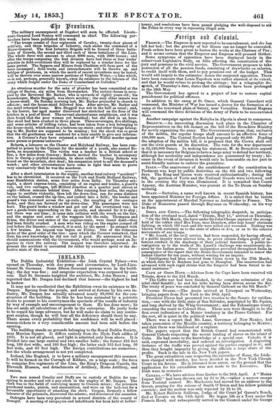Vtuniurto.
The military encampment at Earshot will soon be effected. Lieute- nant-General Lord Seaton will command in chief. The following par- ticulars have been published this week.
"The troops consist of four regiments of Cavalry, twenty-four pieces of artillery, and three brigades of Infantry, each under the command of a Major-General. The first Infantry Brigade will be formed of three batta- lions of Guards, the second and third each of three battalions of the Line. The whole force will amount to about 8000 men, with 2000 horses; and after the troops composing the first division have had three or four weeks' practice in field-evolutions they will be replaced by a similar force for the same period. The Sappers and Miners from Chatham will form part of the force encamped ; field-works and intrenchments will be thrown up, and bridges of pontoons, in which the merit of recent inventions may be tested, will be thrown over some narrow portions of Virginia Water,—a lake which, as is not, perhaps, generally known, owes its existence to the labours of the army which fought under the Duke of Cumberland at Culloden."
An atrocious murder for the sake of plunder has been committed at the village of Becton, six miles from Stowmarket. The rectory-house is occu- pied by the Reverend Mr. Barker, who is upwards of eighty years old ; his housekeeper, Maria Stegipt11, was above seventy ; the only other inmate was a house-maid. On Sunday morning last, Mr. Barker proceeded to church to officiate; and the house-maid followed him. After service, Mr. Barker and the maid returned home. Mrs. Steggall was not in the hall as usual; and, to his horror, her aged master discovered her stretched on the floor of the kitchen in a pool of blood. The servant alarmed some neighbours, and it was then found that the poor woman yet breathed; but she died in an hour. Her skull had been crushed in three places. Three sovereigns, five shillings, and some articles of trifling value, had been taken from a box belonging to the house-maid, which stood in a bedroom up-stairs, and other things belong- ing to Mr. Barker are supposed to be missing ; but the shock was SO great that the old gentleman was rendered for a time unable to give any informa- tion. A Coroner's Jury have returned a verdict of "Wilful murder against some person or persons unknown."
Roberts, a labourer on the Chester and Holyhead Railway, has been com- mitted to prison by the Coroner for the murder of a youth, also named Ro- berts, an acquaintance. The victim was a teacher in a British school at Roe, a few miles from Conway ; Roberta invited the teacher to accompany him to Cerrig-y-pryfaid mountain, to shoot rabbits. Young Roberts was found on the mountain, shot dead; his companion tried to sell the deceased's watch ; and other circumstances have come to light that seem to prove very conclusively that he was the murderer.
After a short intermission in the supply, another fatal railway "accident" has to be chronicled. It occurred on the York and North Midland Railway, near Ilambleton station, some four miles from Selby. On Thursday sen- night, a short express-train, consisting of an engine and tender, a guard's van, and two carriagm„ left Milford Junction at a quarter past eleven at night—fifteen minutes behind time. After running four miles, the engine began to oscillate violently, then left the down-line, ran for some distance on the ballast, crowed the up-line, and rushed into a field; the tender and guard's van remained across the up-rails ; the coupling of the carriages broke, and they ran forward on the down-line. The passengers were not hurt. The guard broke a window and got out of the overturned van; he saw a goods-train approaching on the up-rails, and shouted for it to atop; but there was not time; it came into collision with the wreck on the line, and the engine and some of the waggons left the rails. Thompson and Sykes, the driver and stoker of the express-train, were found dead—they had been fatally crushed. A man who was riding on the engine jumped off just before the disaster,—alarmed, it is said, by the speed : he escaped with a few bruises. An inquest was begun on Friday. One of the witnesses spoke of the good order of the line : upon which the Coroner remarked, that from his own knowledge he did not call it good. He announced that he should communicate with the Government, who would perhaps send an In- spector to view the railway. The inquest was therefore adjourned. At present the accident is accounted for either by excessive speed or the de- fective state of the road.


























 Previous page
Previous page